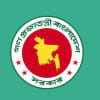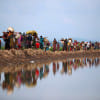Aid passage to Rakhine: ‘Govt can’t decide unilaterally’

BNP and several other parties have voiced concerns over the government reportedly agreeing in principle to a UN proposal for establishing a humanitarian corridor into Myanmar's war-torn Rakhine State.
They said it might bring on a potential threat to national sovereignty and regional security.
The BNP has decided to write to the government, seeking details about the matter and informing it about the party's position.
Leftist and Islamist parties and platforms also opposed the move to establish a corridor, questioning the West's interests in the Rohingya refugee issue. Such a corridor may become a threat to national security, they warned.
The BNP expressed strong resentment over no visible steps from the government to engage the political parties in discussions over the issue.
Its standing committee met at its chairperson's Gulshan office on Monday night to discuss the matter. Party's acting chairman Tarique Rahman presided over the meeting virtually from London.
At the meeting, the BNP decided to send a letter to the interim government over the issue, warning that such a move would pose a threat to the country.
Party leaders also said they would put political pressure on the government over the matter.
The meeting decided that all standing committee members would make specific recommendations on the issue, detailing their observations. Afterwards, the BNP plans to hold a press conference to present its position to the public. It also decided to consult its allies on this issue.
Before leaving Dhaka after a visit to Cox's Bazar Rohingya camps, in mid-March, UN Secretary-General Antonio Guterres said he discussed with Bangladesh authorities the possibilities of channelling humanitarian aid inside Myanmar via Bangladesh as a means of creating conditions for Rohingya repatriation to Rakhine.
He said it would, however, require the "authorisation and the cooperation of the parties to the conflict" in Rakhine, where the Myanmar junta is fighting the Arakan Army rebel group.
Foreign Adviser Touhid Hossain on Sunday said that the interim government agreed in principle with the UN proposal on the corridor, but certain conditions must be met for its implementation.
A day later, BNP Secretary General Mirza Fakhrul Islam Alamgir slammed the interim government for making such a move without consulting the political parties.
Chief Adviser's Press Secretary Shafiqul Alam yesterday said that the government has not held any discussions with the UN or any other entity regarding the creation of the "so-called humanitarian corridor".
BNP Standing Committee member Iqbal Hasan Mahmud Tuku said, "The foreign affairs adviser spoke on a matter that is directly linked to the country's sovereignty. After his statement, various political parties expressed their positions. But suddenly, the press secretary claimed that no such discussion had taken place.
"It appears as though the government is playing a childish game. A country cannot be governed in this manner."
In a statement issued yesterday, the Communist Party of Bangladesh said the "so-called humanitarian gesture" could have serious consequences.
"An interim government has no authority to make such a policy decision," reads the statement from CPB President Mohammad Shah Alam and General Secretary Ruhin Hossain Prince.
It said the move violated the constitution and could jeopardise the country's independence.
The CPB warned that allowing the corridor would leave Bangladesh's borders exposed.
"The Myanmar junta could exploit the corridor under various pretexts, creating new threats to our security," the statement added.
The CPB also questioned the motivation of Western countries, suggesting their sudden interest in the Rohingya issue was "part of a broader imperialist conspiracy".
"The UN and its allies could have opted for alternatives like Sittwe Port or other coastal routes into Myanmar instead of involving Bangladesh," it said.
Bangladesher Samajtantrik Dal General Secretary Bazlur Rashid Firoz condemned the government's "unilateral decision-making" on such a sensitive national issue.
In a statement, he described the corridor as "aligned with the US agenda in the region", warning that it would compromise Bangladesh's sovereignty.
Meanwhile, Islami Andolan Bangladesh Ameer Syed Muhammad Rezaul Karim said the government must build a national consensus before taking such a decision.
"This is not merely a humanitarian matter, it is a national security issue," he said, adding, "Such decisions are inappropriate without broad understanding and agreement between all political quarters."
Hefazat-e-Islam Bangladesh's Joint Secretary General Mamunul Haque strongly opposed the move.
"Imperialist powers are trying to implement their agenda by using Bangladesh. As a patriotic force, Hefazat-e-Islam does not support this in any way," he said at a press conference yesterday.
He also warned that such decisions could drag Bangladesh into unwanted geopolitical entanglements.
Bangladesh Jamaat-e-Islami Ameer Shafiqur Rahman said the humanitarian corridor issue was not clear.
It should be made clear to the nation because it might involve many security issues, he said in a Facebook post on Monday.
Gana Adhikar Parishad chief Nurul Haque Nur accused the government of "playing hide-and-seek" on the proposed corridor.
"If Bangladesh's territory is used for the establishment of a humanitarian corridor to Rakhine, and it jeopardises the country's independence and sovereignty, then all political parties will unite to resist this move," he said at a rally in Shariatpur yesterday, reports our correspondent from the district.

 For all latest news, follow The Daily Star's Google News channel.
For all latest news, follow The Daily Star's Google News channel. 








Comments